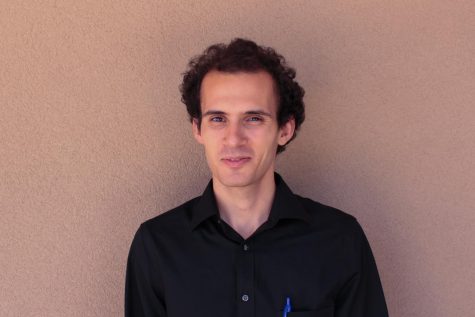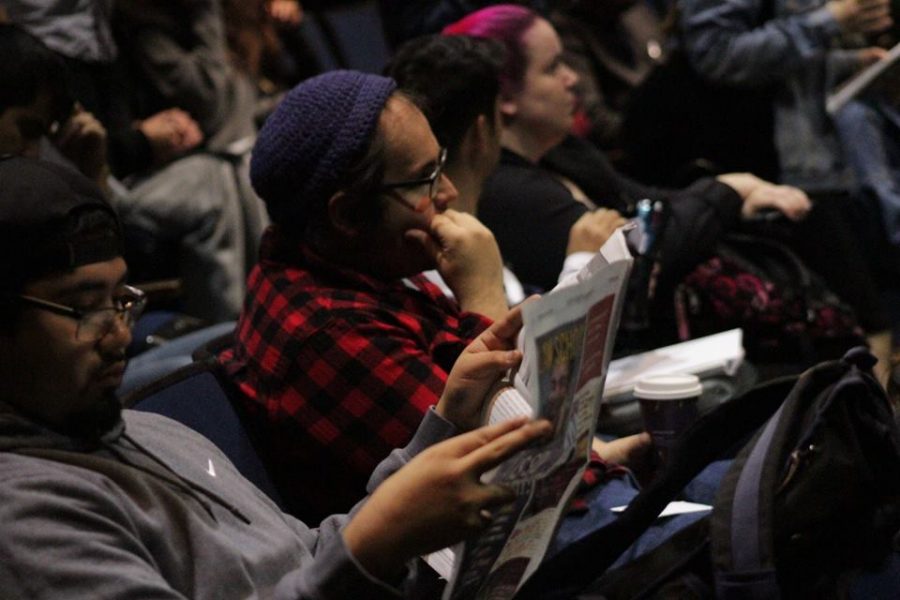Beirut-Based Reporter Speaks to GCC Audience
Lebanon-based AFP News Agency reporter Maya Gebeily spoke to about a hundred students, faculty and staff Nov. 16 about her experiences covering conflict, including Syria’s seemingly never-ending conflict and the ensuing refugee crisis.
“At the end of the day, it’s not about you,” said Gebeily recalling some of her experience earlier in the year to a crowd gathered in the Auditorium for a special journalism event sponsored by the Language Arts’ Journalism program at Glendale Community College. “It’s about the story,” she said, touching on the need for human emotion and capacity for understanding.
Earlier this year while in northern Syria for a month Gebeily reported on the Battle of Raqqa between Kurdish-dominated Syrian Democratic Forces forces and the Islamic State. She had been in contact with a doctor that lived inside Raqqa and was giving her information on what was happening there. After talking to him a couple of times she lost touch with him. Months later, when she was close to the city of the man that she had been talking to, Gebeily met a woman who told her about her son that used to live in Raqqa and was treating people inside the city. The woman said her son had recently been killed.
Gebeily found out that the woman’s son was the man she had been in contact with. She described it as one of the most chilling experiences she has ever had. “It’s really hard to keep your emotions out of the story when something like that happens,” Gebeily said via Skype. “It’s really hard to report on this woman, just as this random person that you met.”
Gebeily comes from a Lebanese background and used to visit Lebanon during the summers as a child, she explained, developing an attachment to her cultural background. Surprisingly, Gebeily never went to school for journalism. After getting her degree in international relations, she realized that she didn’t want to end up behind a desk.
Throughout the years, her interest in Lebanon and Syria had grown bigger and bigger, and Gebeily wanted to see what it was like to actually live and work in Lebanon. In Beirut, she was offered a job at a local news website called NOW Lebanon. A year ago, she got an offer at the AFP.
Gebeily describes Lebanon as a beautiful place to live, and that it’s “not all bombs and war” despite what some may think. Although, being a female journalist in Middle East has it pros and cons, she said. Even though some rooms can be harder to get into, there are rooms only women and children can enter. Gebeily has never been denied an interview, but she explained that it can sometimes be harder for her as a woman to earn someone’s trust and get the information she’s looking for.
Reporting from Middle East comes with taking risks and it’s important to always be prepared in training and equipment. Gebeily said it’s crucial to “never leave without your helmet,” flack jacket and emergency kit.
Understanding how it works and the context that you’re in, what to look out for, who to talk to, where to go, and how to behave when being in a vulnerable situation is the key to being safe, she said.
Gebeily thinks it is important for aspiring journalists to know that they don’t have to be or think in a specific way to become a reporter and that all journalists view things in different ways.
The two most important qualities as a journalist is to be someone that people can trust and to stay curious. “If you can stay curious, if you continue to ask questions, that will take you so far,” she said. “Never take anything for granted, never take an answer for granted, continue to ask why, who, where, when, how.”

Hayk Rostomyan rose to fame as a prominent feature and op-ed writer for the El Vaquero Newspaper. In just a year he climbed the corporate and social ladder...

